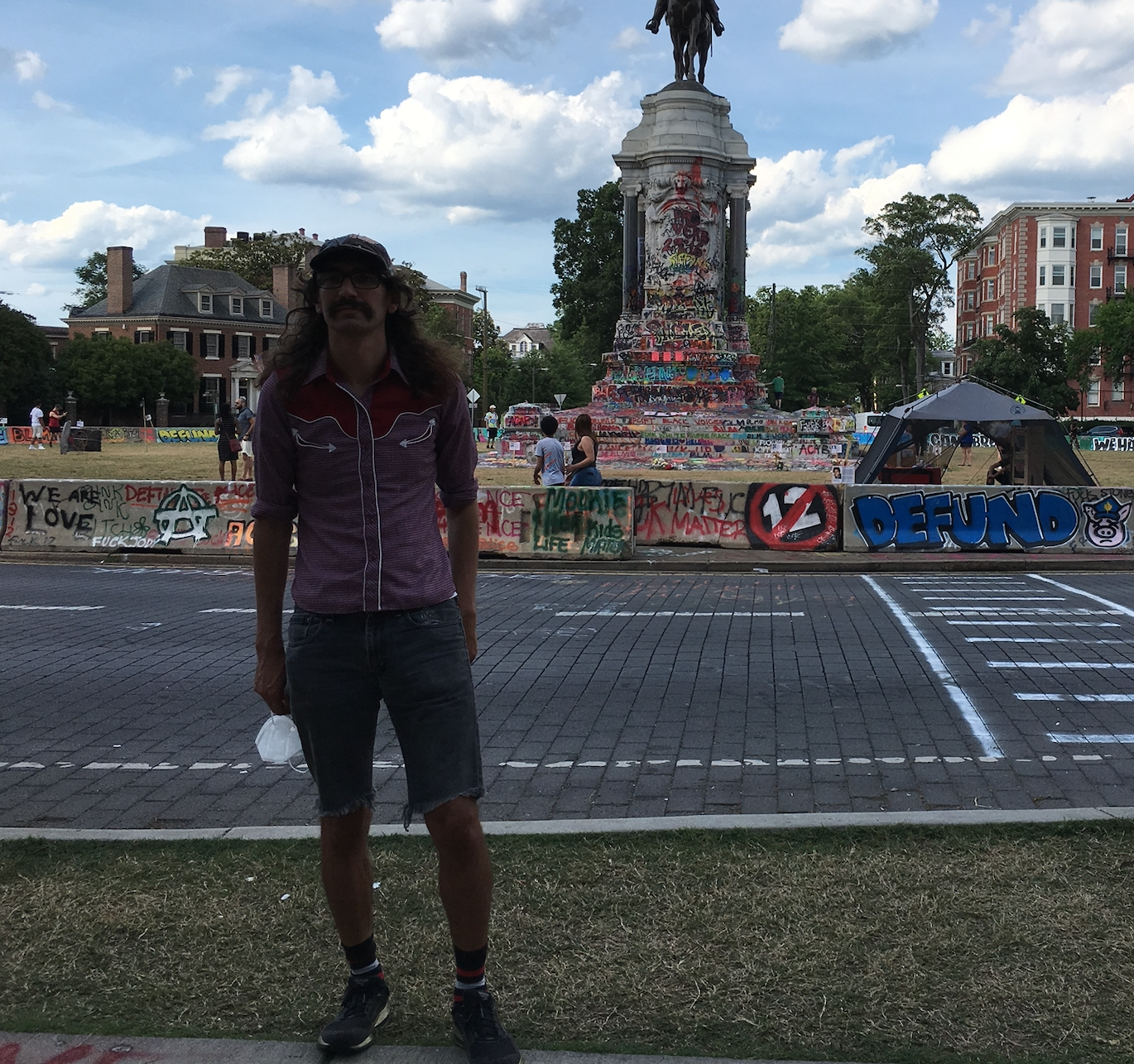
“I had hoped that the white moderate would understand that the present tension in the South is a necessary phase of the transition from an obnoxious negative peace, in which the Negro passively accepted his unjust plight, to a substantive and positive peace, in which all men will respect the dignity and worth of human personality. Actually, we who engage in nonviolent direct action are not the creators of tension. We merely bring to the surface the hidden tension that is already alive.” – Rev. Dr. Martin Luther King, Jr.
***
The George Floyd protests have rightly shone a mirror to America. June’s national media coverage was uncharacteristically searching and probing, though it often fell into the trap of white liberal neophytes asking people of color their opinions on race and nothing else.
Virginia state and local government reporters did well. They get a bad rap but most of them are bright, diligent and insightful; the problem is they are too few and are constrained by retrograde editorial boards and myriad pressures that readers know well. The publication with the most consistently extraordinary coverage of Richmond’s 2020 racial justice protests has been The Commonwealth Times, VCU’s student newspaper. Eduardo Acevedo, Hannah Eason and Andrew Ringle deserve to win multiple Virginia Press Association Awards. There has also been outstanding reporting from Jeremy Lazarus at the Richmond Free Press, Scott Elmquist at Style Weekly, Roberto Roldan and others at Virginia Public Media, Laura Vozzella and Gregory Schneider at the Washington Post, and many talented journalists at The Virginia Mercury and the Richmond Times-Dispatch. Richmond is lucky to have these reporters.
But the best reporting, in my opinion, has come from an unexpected source: the Twitter account of Goad Gatsby. His feed is invaluable for following hour-by-hour breaking news about the nightly Richmond protests – information useful for protesters, sympathizers, news junkies and even those with less admirable intentions. His micro-journalism brilliantly answers the question all Americans face: what should I do to help? He is helping to connect thousands of people to the movement so they can solve problems using their own freedom, resources and creativity.
The following interview took place at the Marcus-David Peters Plaza, outside of the Circle formerly known as Lee.
How did you get involved in the racial justice movement?
I got into activism when I started volunteering at Food Not Bombs. I’ve been a part of the Occupy movement, the antiwar movement, and then I started getting into antiracist actions, starting with Black Lives Matter when it reached its first pinnacle in 2014. I started researching neo-Confederate and fascist groups that operate in Central Virginia, so by 2017, I was confronting fascist groups on the streets of Charlottesville. Now we’re in the year 2020, and I understand that what was going on in Charlottesville is also going on in Richmond, except now it’s at the hands of the police.
What do you see as your role? How do you use Twitter and how many followers do you have?
About 14,000 [roughly half as many as Levar Stoney]. A lot of people in the movement are in their teens and twenties: this is a youth-led movement. I’m 34, I’m not youth anymore. This is also a movement with informal leadership of Black people. My role is to listen to other people and show up. In terms of planning and organizing, I don’t have any say other than: this is what I think is happening.
My role on Twitter is kind of pointing out the obvious. I got turned off of Facebook after the Cambridge Analytica scandal, and I don’t think that Facebook was protecting its users. Twitter is a simpler platform.
There’s a lot of misinformation out there. For example, if there was an event, somebody might say, “I saw a Klansman down at the cemetery.” And you think, “Is there a picture of this? What did he look like, what cemetery?” You get frustrated by the lack of information. Report what you see or what you can verify through pictures and videos. When I found out that fascist groups were reading my Tweets, I would use sarcastic Tweets in hopes that it would confuse them and keep them up at night. But when I’m at actions I find it important to tell people vital information that I’m personally seeing that can be shared: I see four police cars at this intersection, I saw a truck with a Confederate flag driving by.
Another thing to keep in mind is that I am a guest in this space. Every person involved in this should have a say as to whether I take their picture or not. I’ve received a lot of harassment from fascist groups. I have the best intentions when I take a picture, but if it gets shared, it could get in the hands of some bad people, and they can find ways to harass. So I try to hide people’s faces as much as possible, to focus on those who are voluntarily wanting to show their appearance, or if it’s police violence. As to the latter, they should have body cam footage of it, so you’re not incriminating anybody. You just have another angle that is for public consumption and not for the police to put out whenever they find it convenient.
What advice would you give to a white person who has the freedom and ability to get involved in the racial justice movement but has not yet done so?
What has stopped a lot of white people from coming out is that they don’t know what to do. Maybe they’ve seen footage of protesters dressed in black fighting with the police. That’s a good impulse, don’t do that. But there are so many other roles. You can hand out food, water, medical supplies. You can train to be a street medic to provide first aid to people suffering from tear gas, mace, or being hit by rubber bullets. You can learn how to set up communications with people. You can become a bike scout so you can report back what you see so there isn’t misinformation. You can have your car and drive around and provide transportation. You can babysit other people’s kids so the parents can go out and participate. There is no shortage of roles.
If you want to go out, you don’t have to be Frodo. You don’t have to destroy the ring, you don’t have to be the One. You can be Sam. You can be the person who helps out and holds your friend’s stuff and tries to keep everybody on board, calm and collected.
How would you describe the media coverage of the Richmond protests?
It’s very mixed. There are reporters who are making tremendous effort to get great stories. That’s great, keep it up. There are reporters with very limited deadlines. I’m not mad at them, but it’s a bad system. There are reporters who are going to exploit these situations for sensational headlines. In that case, I remember that they are not here to help you: they are here to help themselves. With that in mind, try to understand that even the people you think are against you are just confused, and they’re working a bad reporter job, and they don’t like it any more than the person they’re asking.
What are the best media sources if people want to know the truth about Richmond protests? Is there one?
It’s difficult. Even when I’m witnessing things, I don’t see the full picture. It’s very difficult for one reporter to have the full story; it’s really difficult for one news outlet to have enough reporters to see everything themselves.
I think that The Commonwealth Times has been doing very well, as has Virginia Public Media. Also, there’s been a surprising upturn from the Richmond Times-Dispatch. In terms of local corporate television, they’ve been struggling to keep up and get reporters to the scene. They have insurance policies that keep them from getting too close to people. They’re also held up by parent media companies that restrict the framework for their stories. It’s very common for news outlets to take police statements at face value, though the police have been lying for at least a month straight at this point.
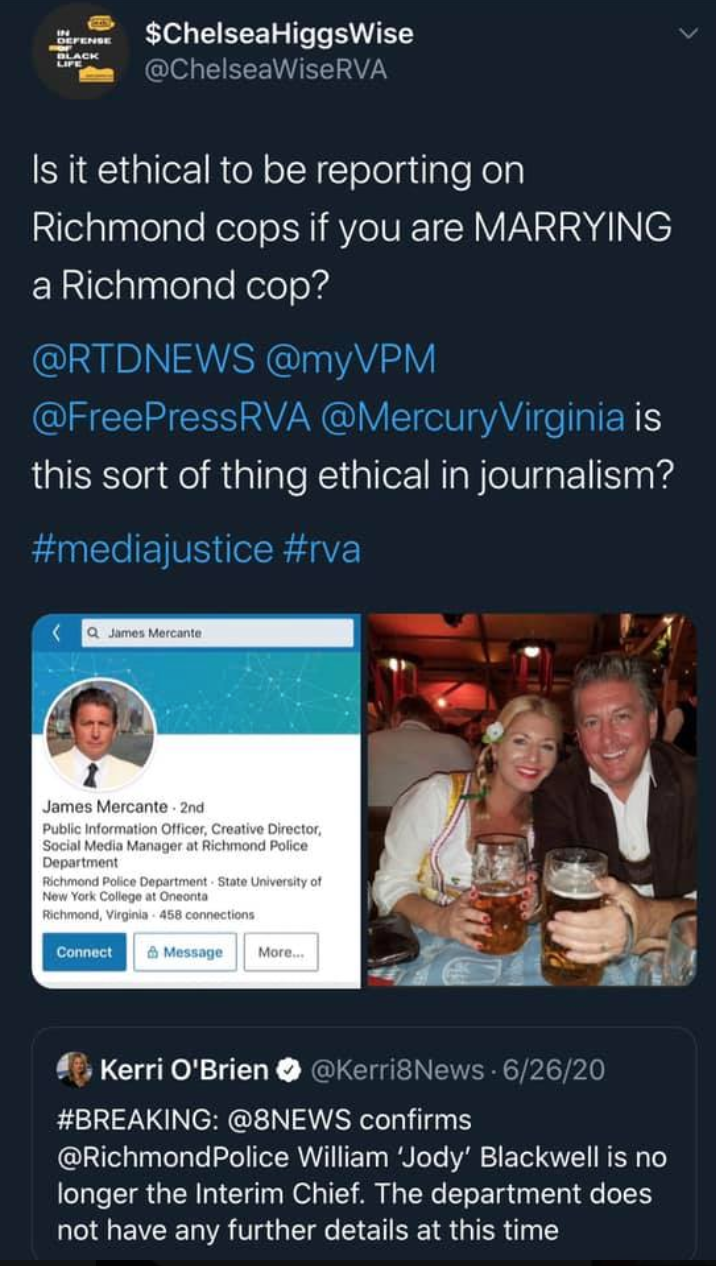
In one story, the person who was interviewing me did not have control over their own chyron, which came across as “Protesters Attack.” That was inaccurate. I told the reporter, and that person said that it was not their decision. I don’t fault them, but this is just one example of the structural problems to reporting.
If somebody is elderly and is not able to come into the streets during the pandemic, what are the best charities to donate to?
The Richmond Community Bail Fund has been very helpful to people who have been arrested for what I would call baloney infringements of free speech, whether it be curfew or unlawful assembly. The Richmond Action Alliance has been helping out with donations for water and food: when people come out, they have to take care of themselves to stay healthy.
There are broader organizations, such as Richmond for All, which has been part of more than just this movement but has stepped up in this movement, as well as the Virginia Student Power Network. I’ve known a lot of these people for years. They’re activists making connections, going out in the street, doing the work, questioning the right people and holding them to account.
I feel if anybody is elderly and cannot come out during the pandemic, you should at least take a night to follow around the protesters in your car. Somebody gave me a ride in their car a couple of nights, and it’s a great feeling, just to get a sense of it all.
Since coming through this, it’s become more and more apparent that policing in Richmond is in direct conflict with how we do democracy here. People come out and say, you have to vote. I’m not going to knock voting, but you can’t vote out police. You can’t vote out a police officer who tear gasses people walking home. You can’t vote out the police system, so there needs to be direct action. It takes a diversity of tactics to do these things, but it frustrates me when people say, just go out and vote. Voting is great, but you need to take action the other 364 days of the year.
***
Jeff Thomas is the author of The Virginia Way: Democracy and Power after 2016.


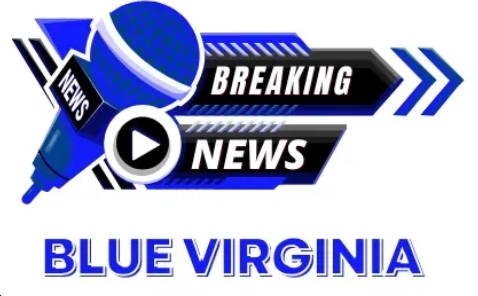 Sign up for the Blue Virginia breaking news newsletter
Sign up for the Blue Virginia breaking news newsletter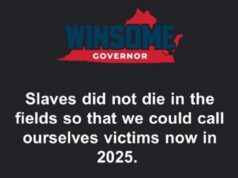
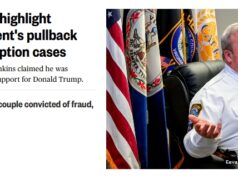
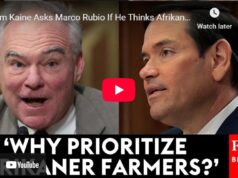

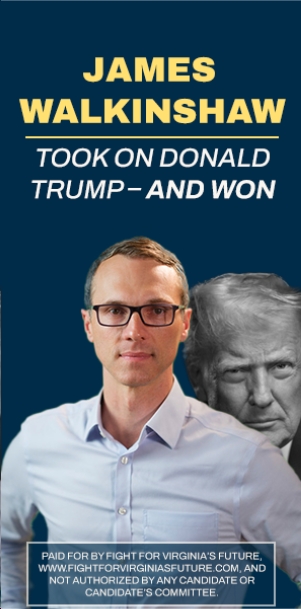
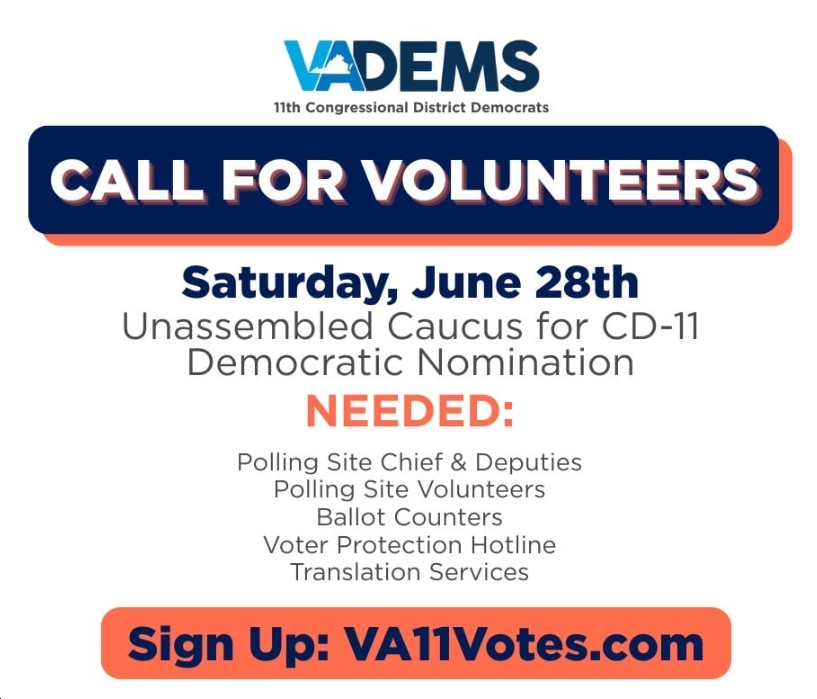
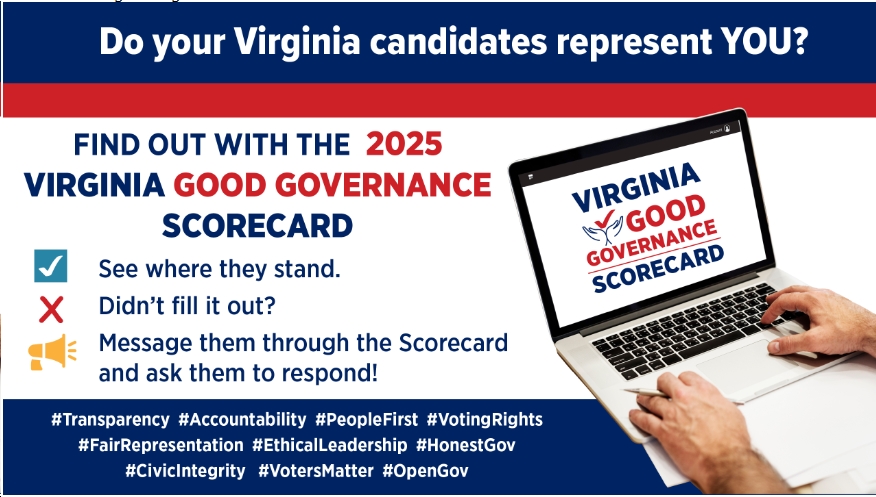



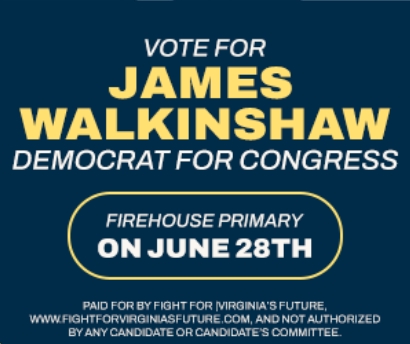
![Blue Virginia Interview: VA11 Dem Candidate James Walkinshaw Vows, “I would absolutely continue Gerry [Connolly]’s legacy and work of fighting Republicans tooth and nail when they’re going after our values…our democracy”](https://bluevirginia.us/wp-content/uploads/2025/05/connollywalkinshaw-100x75.jpg)

